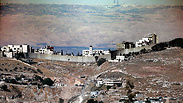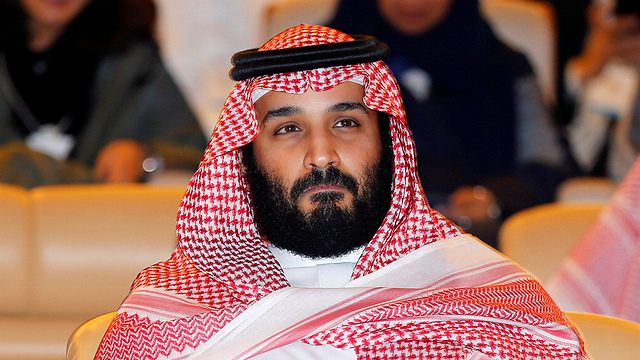
Report: Saudis told Abbas no E. J'lem capital, settlements stay
Saudis deny New York Times report that the Crown Prince told PA President Abbas during meeting in Riyadh that he had two months to accept US peace plan, or resign, that calls for Abu Dis as capital of Palestinian state, keeps majority of Israeli settlements intact, provides limited Palestinian sovereignty and precludes contiguous borders; US: 'report more speculation.'
The new plan, reportedly presented to Abbas during a low profile trip to Riyadh, lay out the basic foundations upon which any future Palestinian state would hinge, and suggested that the suburb of east Jerusalem, Abu Dis, could be a future Palestinian capital.
It would not make provisions for a Palestinian right of return, would carve out non-contiguous borders in the West Bank and will cater for limited Palestinian sovereignty. In addition, the proposal will leave the majority of Israeli settlements intact.
The report claimed that both Arab and European officials had heard Abbas’s version of the meeting with Crown Prince Mohammad bin Salman—who last month was reported to be preparing to succeed his father, Salman bin Abdulaziz, as king—and deduced that the US peace push would be “more tilted toward the Israelis than any ever embraced by the American government, one that presumably no Palestinian leader could ever accept.”
Citing a senior Lebanese official and a Lebanese politician, Abbas had been given, the report added, two months to sanction the deal or face pressure to resign. Furthermore, a Palestinian official in Lebanon allegedly suggested that the loss of territory in the West Bank be compensated in land in the Sinai Peninsula, that would append the Gaza Strip.
The New York Times also stressed that the White House had denied the veracity of the report, insisting that months lay ahead before a final framework would be fully fleshed out. Moreover, the Saudi government said that it did not support the plan.
According to the report, Joshua Raffel, a White House spokesman, dismissed the claims as more speculation about to what cards the Trump administration is keeping close to its chest on the peace talks.
“There is constant speculation and guessing about what we are working on, and this report is more of the same,” Raffel was quoted as saying in The New York Times. “It is not reflective of the current state of the plan we are working on or the conversations we have had with regional players.”
In addition, the content of the plan was apparently repudiated by the Saudi ambassador to the United States, Prince Khalid bin Salman, in an email that sought to reiterate the country’s commitment to the Arab peace initiative that subscribed to the fundamental preconditions laid down by the Palestinians.
“The Kingdom remains committed to a settlement based on the Arab peace initiative of 2002, including East Jerusalem as the capital of a Palestinian state based on the 1967 borders. To suggest otherwise is false,” the email read.
Indeed, speculation has thus far been a common theme of the Trump administration’s peace initiative, with senior officials involved offering only ambiguous comments, notably light on details.
Last month, for example, the New York Times also reported that President Donald Trump and his Middle East advisors had begun to formulate the basic framework of a renewed peace initiative to the Israel-Palestinian conflict.
“We have spent a lot of time listening to and engaging with the Israelis, Palestinians and key regional leaders over the past few months to help reach an enduring peace deal,” said US Special Middle East Envoy Jason Greenblatt.
On Sunday, Trump’s other special Middle East advisor and son-in-law Jared Kushner said that the US president was still examining moving the US embassy from Tel Aviv to Jerusalem, but that no decision had been finalized.












